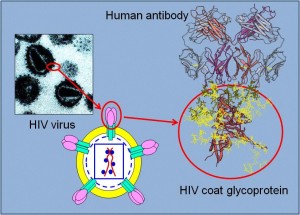
Schematic diagram of an HIV virus and it’s coat glycoprotein bound to an antibody. Image from Corpus Christi College Oxford.
A South African study offers hope that an HIV vaccine can be developed. Certain changes in the virus’ coat proteins appear to trigger a more robust production of antibodies. From NPR news:
One of the women had neutralized 88 percent of 225 HIV virus subtypes after three years with the virus, while the other woman had neutralized 46 percent of 41 subtypes after two years of infection.
The researchers found that a specific change in the coating of the HIV virus appeared to be the trigger for the women to produce antibodies that could thwart its entry into cells.
One reason the HIV virus has proven so difficult to fight is that it is skilled at hiding from antibodies that can block the virus from attacking cells. But researchers believe that the more they understand how the antibodies develop, the better chance they have at developing an HIV vaccine.
The original research paper appears in Nature magazine.